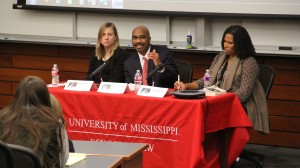
Profs. Antonia Eliason, Larry Pittman, and Mikki Harris expounding at the Martin Luther King Commemorative Panel held at the Ole Miss Law Center
OXFORD, Miss. – Race, the media, events in Ferguson, Missouri, and the Romani people of Europe were among the topics discussed Monday (Jan. 26) during the Martin Luther King commemorative panel on “Race and Civil Rights – in the U.S. and Abroad ” at the University of Mississippi School of Law.
The event, witnessed mostly by law students, focused on Martin Luther King’s legacy to how the press evolved from coverage of the civil rights movement, as well as the correlations of marginalized groups in the U.S. and Europe.
Panelists included Larry Pittman, professor of law; Antonia Eliason, assistant professor of law; and Mikki Harris, assistant professor of journalism. Jack Nowlin, professor and associate dean of law, also offered comments and facilitated.
After a short clip of the famous “I Have a Dream” speech, Pittman discussed his review of King’s writings. “Everyone knows about the speech,” he said. “I wanted to look at the man.”
After discussing King’s maturity at age 26 to become the leader of a movement that was a catalyst for change, he discussed some of the implicit and explicit racism that still exists.
Continuing the conversation on race and the civil rights movement, Harris spoke on the role of journalists as “watchdogs,” the history of the black press and how responsible journalism has an effect on people.
She also discussed how major news networks such as CNN and Fox News tend to limit perspective on events and how using multiple sources is a great thing. “Social media allows us to hear more stories about different perspectives,” she said.
Harris offered suggestions on embracing the power that journalists have and how to use it responsibly: “Find and capture moments that show a new perspective. You have the choice to show different parts and moments of the story.
“Moments that show the person – you can broaden people’s minds, you can show history, be entertained and generate discussion. Get access, go beyond the external, see who that person is at core, present a story that challenges the stereotype.”
Offering some international perspective of social injustices, Eliason discussed the plight of the Romani people in Europe and the discrimination that they’ve experienced throughout the last 1,000 years. Remaining on the fringes of European society, they are subject to racism and stereotyping similar to the experience of African-Americans, said Eliason, and they continue to suffer from years of economic and social segregation.
An audience member asked if continuing to have discussions on race is beneficial in a “post-racial society.” “I don’t believe we are in one,” Eliason replied.